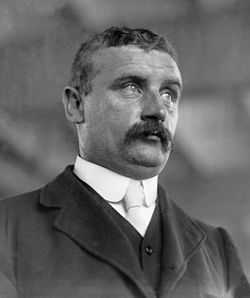Charles P. Dixon
 | |
| Full name | Charles Percy Dixon |
|---|---|
| Country | Great Britain |
| Born |
7 February 1873 Grantham, England |
| Died |
7 April 1939 (aged 66) London, England |
| Singles | |
| Highest ranking | No. 6 (1913, A. Wallis Myers)[1] |
| Grand Slam Singles results | |
| Australian Open | QF (1912) |
| Wimbledon | F (1901, 1911) |
| Other tournaments | |
| Olympic Games |
|
| Doubles | |
| Grand Slam Doubles results | |
| Australian Open | W (1912) |
| Wimbledon | W (1912, 1913) |
| Other Doubles tournaments | |
| Olympic Games |
|
| Other Mixed Doubles tournaments | |
| Olympic Games |
|
| Team competitions | |
| Davis Cup | W (1912) |
| Olympic medal record | ||
|---|---|---|
| Men's Tennis | ||
| Bronze | 1908 London | Doubles |
| Gold | 1912 Stockholm | Indoor mixed doubles |
| Silver | 1912 Stockholm | Indoor singles |
| Bronze | 1912 Stockholm | Indoor doubles |

Charles Percy Dixon (7 February 1873 – 29 April 1939) was a male tennis player from Great Britain. He was a four-time Olympic medallist and led a successful British team to victory in the Davis Cup.
Biography
He was born on 7 February 1873 in Grantham, Lincolnshire. At the 1908 Summer Olympics in London he won a bronze medal in the men's doubles event. In the 1912 Summer Olympics he won three medals in the indoor tennis events: gold in the mixed doubles, silver in men's singles and bronze in men's doubles.[2][3]
From 1929 to 1932 he represented the International Club of Great Britain against France at Queens and at Ateuil in 1932 and 1933. After retiring from tournaments, he coached juniors and umpired at Wimbledon, becoming President of the Umpire's Association. He died on 29 April 1939.[2]
Tennis tournaments
Dixon was born in 1873, the year that Major Walter Clopton Wingfield defined the first rules for lawn tennis. Dixon participated in games played during those early years. His early career included victories in international tournaments overseas:
- 1905 Ostend International tournament - won
- 1908 Doubles at the Championship of Dieppe (Championnat de Diepper) - won partnering with J. G. Ritchie [4]
- 1911 Surrey Championship, defeating Anthony Wilding in four sets.[5]
Dixon was better known at the time for his many successes when representing Britain in the Davis Cup: starting in the 1909 Cup in Philadelphia, he led the British team to victory in the 1912 Cup in Australia.[2]
He was a member of the English Drive Club team in South Africa in 1910-1911, and reached the final of the Wimbledon Tennis Championship later that year. He was runner-up to Herbert Roper Barrett, his partner in the Davis Cup, and with whom he won the doubles at Wimbledon in 1912 and 1913.
He won the 1913 Doubles title at the Russian Open Tennis Championship, partnering Albert D Prebble, and was runner up in the singles. [6]
Other sports
He represented Haileybury and Cambridge at racquets, winning the silver medal in 1891. He was also a keen prize-winning golfer, and represented Britain in international fencing in Paris.
His brother, J A Dixon, was captain of Nottinghamshire County Cricket Club.
In 1897 he married Louise Robinson, and until his death they lived at Chestnut Road, West Norwood.
He died on 29 April 1939 in West Norwood, London.
After cremation his ashes were buried nearby at the Robinson family plot in West Norwood Cemetery.
References
- ↑ United States Lawn Tennis Association (1972). Official Encyclopedia of Tennis (First Edition), p. 422.
- ↑ 2.0 2.1 2.2 "Charles P. Dixon, 64, Former Tennis Star. Helped Win Wimbledon Doubles Title for England in 1912". New York Times. 1 May 1939. Retrieved 17 December 2010.
Charles P. Dixon, member of the English Davis Cup team which played against the United States in 1909 in Philadelphia and a member of the Wimbledon doubles championship team, 1912-13, died yesterday at the age of ...
- ↑ "Charles P. Dixon Olympic Results". sports-reference.com. Retrieved 2013-05-15.
- ↑ Championnat de Diepper, La Presse, p3, 3 August 1908
- ↑ "Lawn Tennis". Evening Post. 29 May 1911. p. 7.
- ↑ The early Russian Lawn Tennis Championships (1907-14) by Mark Ryan
| ||||||